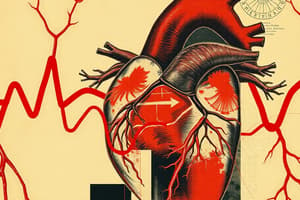Podcast
Questions and Answers
What is the main function of the circulatory system in the human body?
What is the main function of the circulatory system in the human body?
Delivering oxygen and nutrients to body tissues.
Explain the role of capillaries in the circulatory system.
Explain the role of capillaries in the circulatory system.
Capillaries are tiny vessels where blood and tissues exchange nutrients, oxygen, and waste products.
What is the difference between arteries and veins in terms of the blood they carry?
What is the difference between arteries and veins in terms of the blood they carry?
Arteries carry oxygen-rich blood away from the heart, while veins carry oxygen-poor blood back to the heart.
Describe the composition of blood type AB.
Describe the composition of blood type AB.
How does the circulatory system help in regulating body temperature?
How does the circulatory system help in regulating body temperature?
What is the significance of blood groups in blood transfusions?
What is the significance of blood groups in blood transfusions?
What are the two primary cycles of the heart's function?
What are the two primary cycles of the heart's function?
Describe the process of pulmonary circulation.
Describe the process of pulmonary circulation.
What is the size of the heart in comparison to another object?
What is the size of the heart in comparison to another object?
How many chambers does the heart have?
How many chambers does the heart have?
What drives the cardiac cycle in the heart?
What drives the cardiac cycle in the heart?
Why is blood circulation important for our bodies?
Why is blood circulation important for our bodies?
Study Notes
The Circulatory System: Heart, Blood, and Vessels
The circulatory system is a complex network of organs and vessels that ensures the continuous flow of blood throughout our bodies. This life-sustaining system performs several crucial functions that ultimately keep our cells alive and healthy. In this article, we'll dive into the heart's structure and function, the process of blood circulation, the role of blood vessels, and the importance of blood groups.
Heart Structure and Function
The heart is a muscular organ that pumps blood through the circulatory system. It's roughly the size of a fist and is divided into four chambers: two upper atria and two lower ventricles. The heart's function can be broken down into two primary cycles:
- Atrial systole: The atria contract and send blood into the ventricles.
- Ventricular systole: The ventricles contract and send blood into the circulatory system.
This cyclical process, known as the cardiac cycle, is driven by electrical signals that cause the heart muscle to contract.
Blood Circulation
Blood circulation is the continuous movement of blood throughout the body. The circulatory system has two primary loops:
- Pulmonary circulation: Oxygen-poor blood from the body's tissue is returned to the right atrium, where it is then pumped to the lungs. In the lungs, carbon dioxide is removed, and oxygen is absorbed into the blood, which then returns to the left atrium.
- Systemic circulation: Oxygen-rich blood from the left atrium is pumped to the body's tissues, picking up carbon dioxide waste. Blood then returns to the right atrium, beginning the cycle again.
Blood Vessels
Blood vessels are the system's pipelines, carrying blood to and from the heart and throughout the body. Vessels are categorized into three types:
- Arteries: These carry oxygen-rich blood away from the heart.
- Veins: These carry oxygen-poor blood back to the heart.
- Capillaries: These are tiny vessels where blood and tissues exchange nutrients, oxygen, and waste products.
Importance of the Circulatory System
The circulatory system performs several critical functions:
- Delivering oxygen and nutrients to body tissues.
- Removing carbon dioxide and other waste products.
- Regulating body temperature.
- Providing a mechanism for hormone distribution.
- Protecting the body against pathogens through the immune system.
Types of Blood Groups
Each person has a unique blood type based on the presence of specific antigens and antibodies in their blood. The four main blood types are A, B, AB, and O:
- Type A: This blood type contains the A antigen on red blood cells and antibodies against B in plasma.
- Type B: This blood type contains the B antigen on red blood cells and antibodies against A in plasma.
- Type AB: This blood type contains both A and B antigens on red blood cells and no antibodies in plasma.
- Type O: This blood type contains no antigens on red blood cells but has antibodies against A and B in plasma.
Understanding the circulatory system's structure, function, and importance provides a foundation for understanding human health and disease. It's a complex and fascinating system that never ceases to amaze us with its intricacy and ability to keep us alive and thriving.
Studying That Suits You
Use AI to generate personalized quizzes and flashcards to suit your learning preferences.
Description
Test your knowledge on the heart's structure and function, blood circulation process, the role of blood vessels, and the significance of different blood groups in the human circulatory system. Explore how this life-sustaining system delivers oxygen, removes waste, regulates temperature, and protects the body against pathogens.





